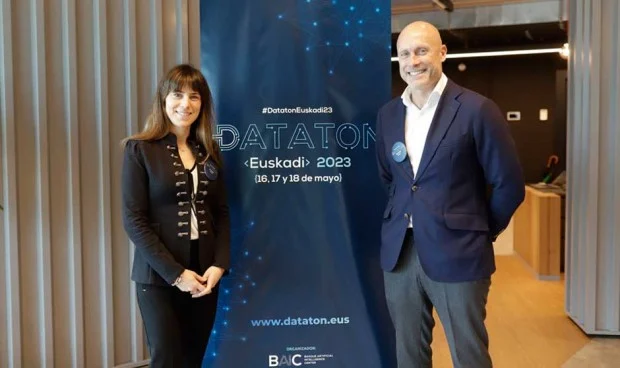[vc_row][vc_column][vc_column_text]The technology company presents its artificial intelligence project applied to its Agile System logistics system.
Immersion in the world of artificial intelligence was made possible in the Basque Country thanks to the Datathon, an event organised by the BAIC (Basque Artificial Intelligence Centre) between 16 and 18 May. The event saw the participation of ten companies divided into five teams that responded to the challenges posed, based on the detection of anomalies in industrial drives, the segmentation of medical images, the optimisation of processes or the improvement of energy efficiency in a plant.
These five teams are made up of companies and technology providers who are experts in artificial intelligence. Together they have developed solutions to real-world problems by creating models and algorithms that combine the best of data science with domain expertise. One of these groups was formed by Cardiva and Versia, which took part in this three-day event to “create a reliable model for predicting demand for medical materials and optimising both stocks and delivery routes”, as Unai Atristain, Clinical Director of Cardiva, explained.
This will be achieved by obtaining data thanks to Cardiva’s logistics system, Agile System. This is a distribution model based on radiofrequency that is present in thirteen hospitals and which serves to capture real-time information on stocks and consumption for subsequent management, according to Atristain.
“This means that healthcare personnel do not have to do administrative work,” explains the director. “Managing the data in real time allows for greater responsiveness and service to the hospital,” he adds.
From data to the model
“Once we have the data, we will use artificial intelligence to create a model with algorithms that allow us to make hypotheses about possible peaks in demand, as well as to know the circumstances that condition them in order to be able to anticipate them as a supply chain and optimise these processes,” he adds.
The advantages of this model are several, as the director explains, “not only will it help to optimise space in hospital warehouses, which is usually scarce, but it will also allow us to start thinking about how to foresee future needs in order to anticipate them and not stop the activity of the centres”.
“This model will allow us to anticipate the needs for medical materials and not stop the activity of the centres”.
“In the case of Cardiva, AI at the service of its data offers great potential,” explains Marrón. “Cardiva is a company that is committed to innovation and has a great track record in digitisation and data management. They are ready to take a step forward, evolve their business model and offer new services,” he adds.
Artificial intelligence in healthcare
For Marrón, artificial intelligence can have a “very positive impact on the healthcare world”. Not only in the areas of logistics, distribution and storage, but also “as a tool for healthcare staff to spend less time on repetitive tasks and focus on generating more value; for advances in diagnosis through imaging of different pathologies and even for the personalisation of more individualised treatments”, she points out.
In addition, there would also be “virtual assistants or chat bots” for patients to access medical information more quickly. “All these kinds of advances are being made by putting the patient first and making sure that he or she is supported and that critical decisions are always taken by a medical professional,” says Marrón.
Laura Marrón, director general of the BAIC, explained that the aim of these three days is “to give the companies taking part a real idea of the benefits that AI brings them and to allow them to experience the work behind the processing of data, which in many cases they are unaware of”.[/vc_column_text][/vc_column][/vc_row][vc_row][vc_column][dt_blog_list post_type=”posts” cl_image_width=”25%” cl_dividers_color=”#ffffff” content_bg=”n” image_sizing=”proportional” posts_offset=”0″ posts=”4813″][/vc_column][/vc_row]


